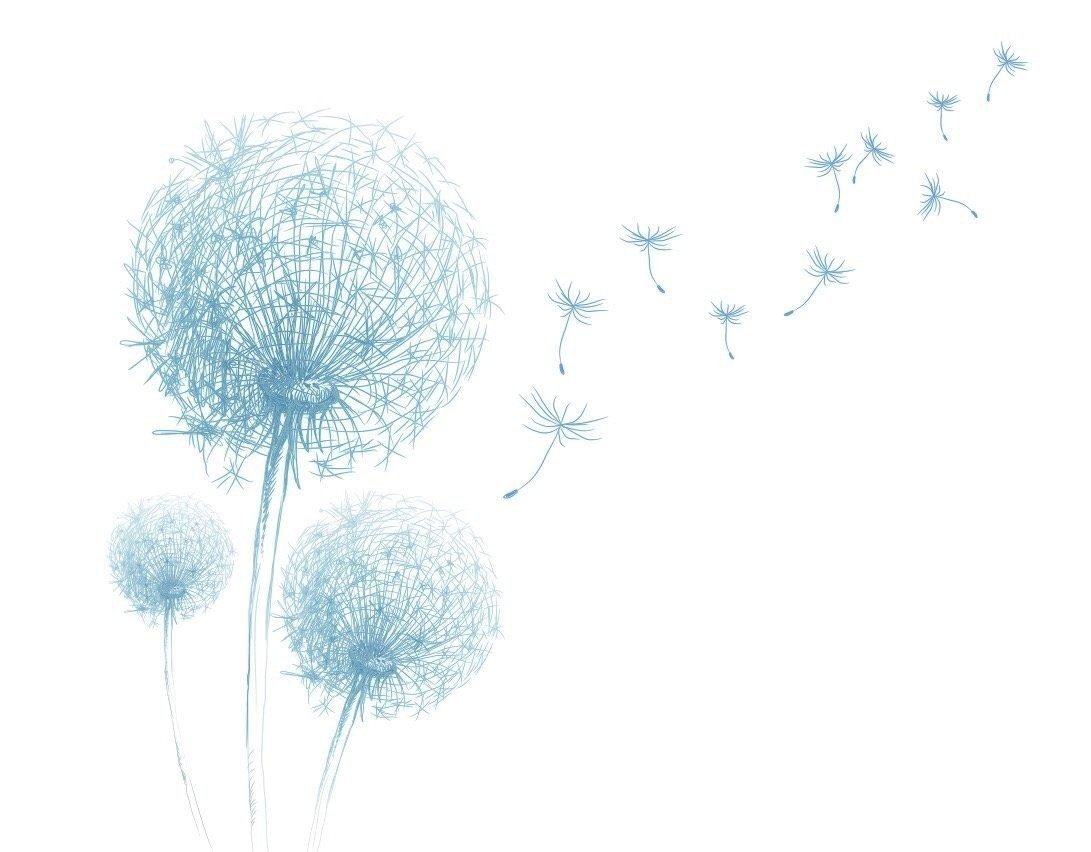
poems by rachel kellum
to comment ✒️ click on a title
Self-Interview in The Nervous Breakdown
This interview was published in The Nervous Breakdown on January 15, 2013. I bumped into it again while migrating content from the old wordweeds website. Enjoy!
You’ve been awfully quiet today. What’s up?
I’ve been thinking of my attraction to bardo spaces. The in-between places. I suppose I’ve been dancing there since my early 20s when I left organized religion and began formally pursuing the visual and literary arts. An early exhibit of oils and monotypes called Between featured quasi-mythological, autobiographical figures knee-deep to chest-high in water, both on land and at sea at once. Looking back, it isn’t a surprise that ten years later I would begin seriously studying Tibetan Buddhism where this concept of the between figures prominently. It’s a natural fit for me. Any philosophy that makes a practice out of living beyond duality and with the concept of both/and feels like home.
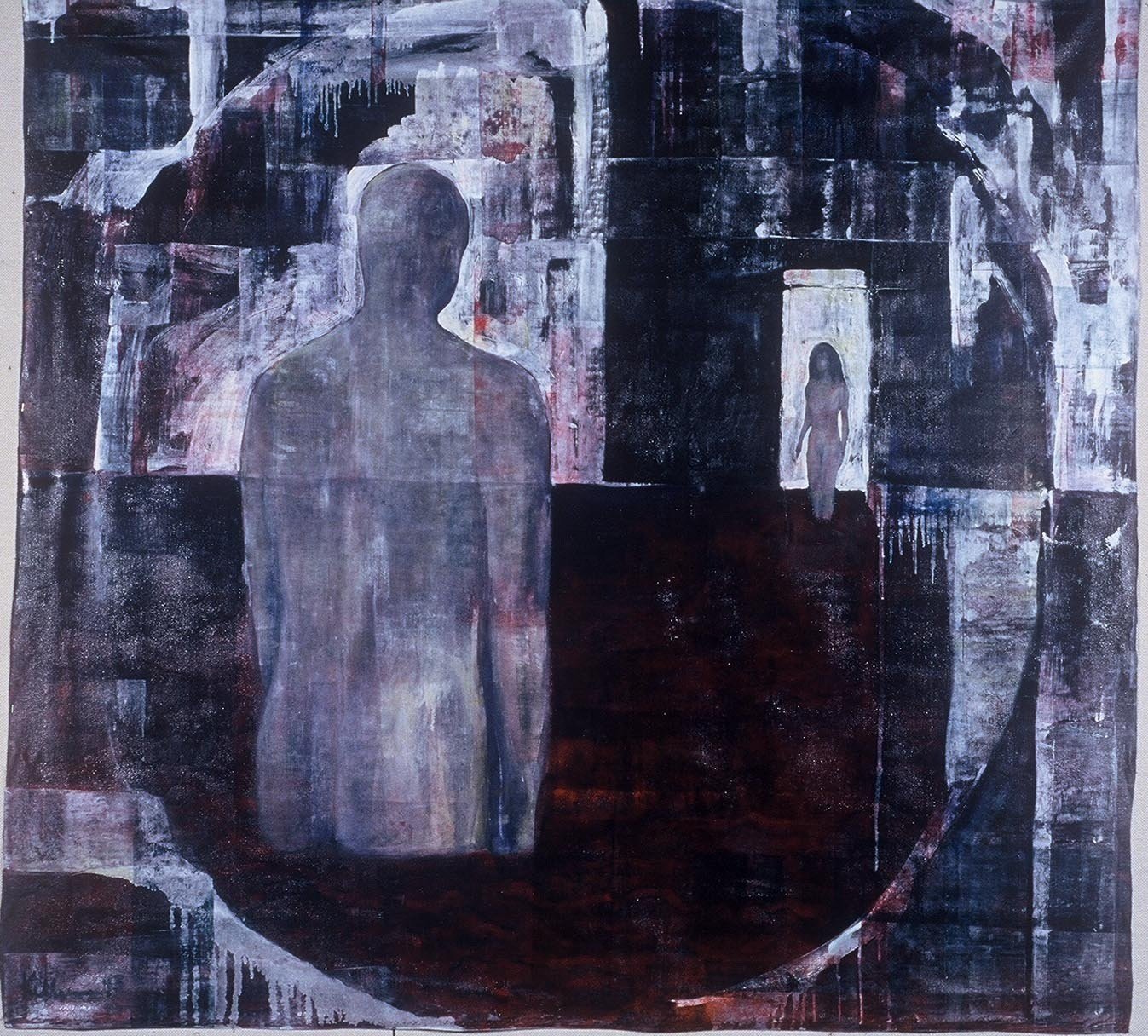
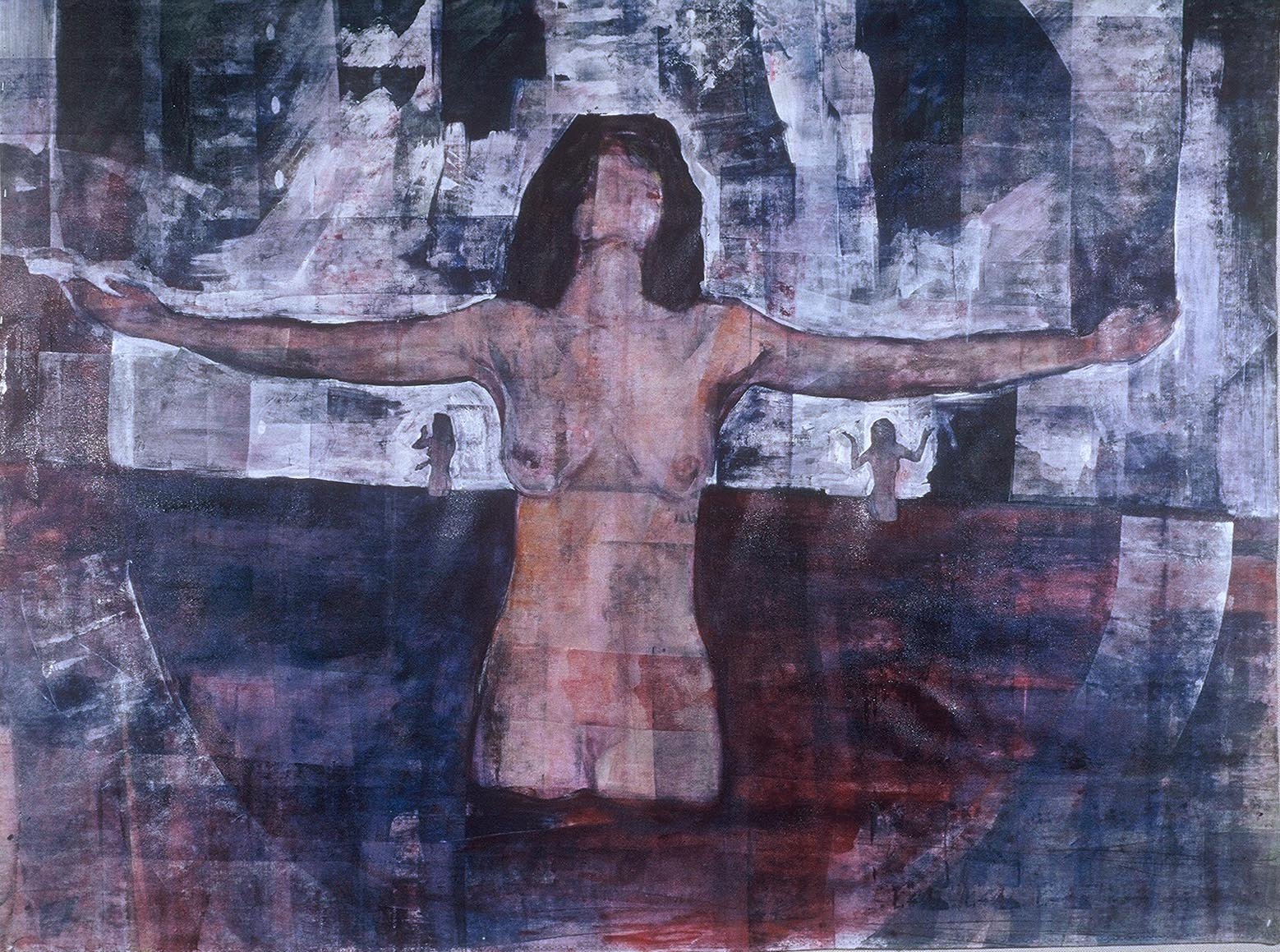
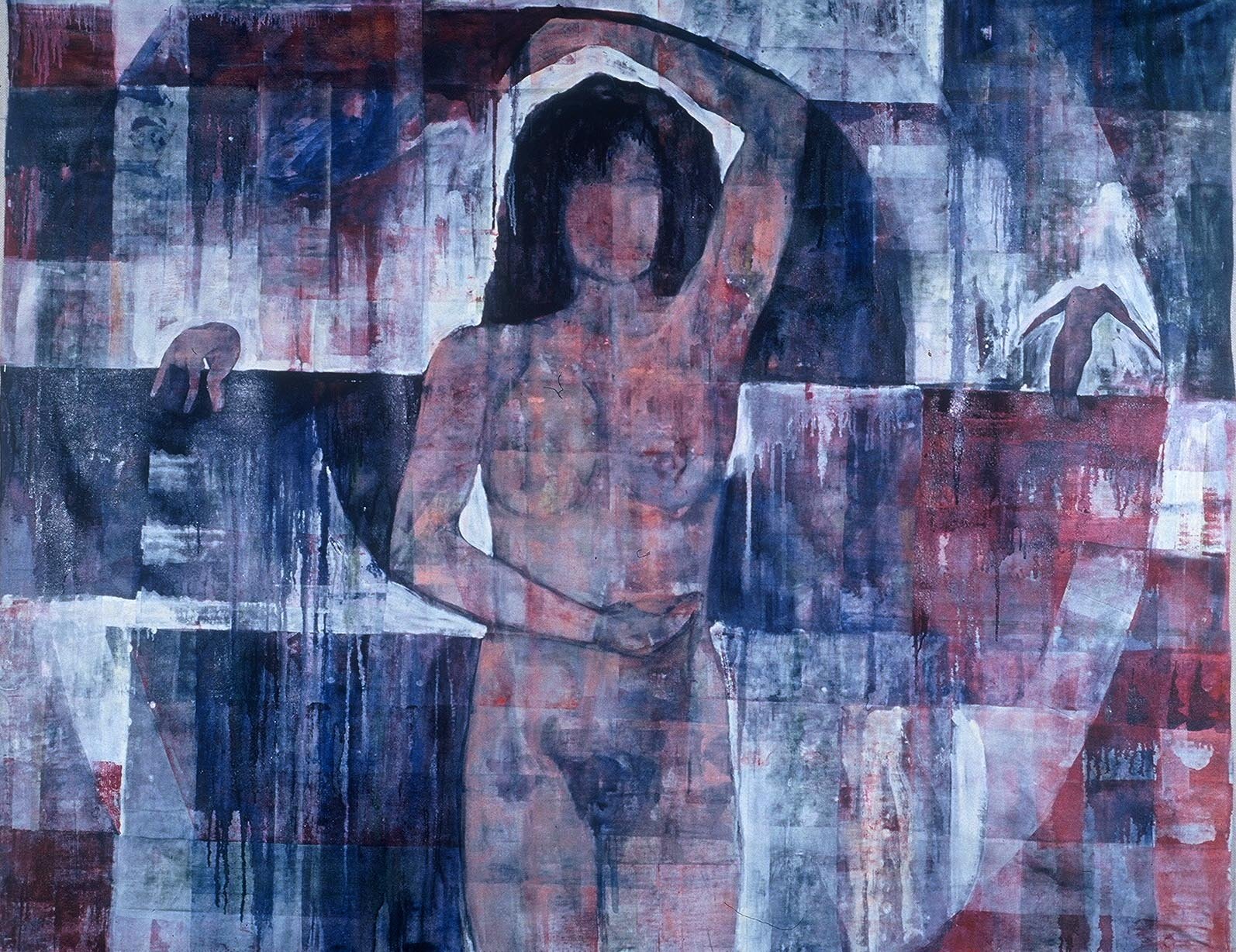
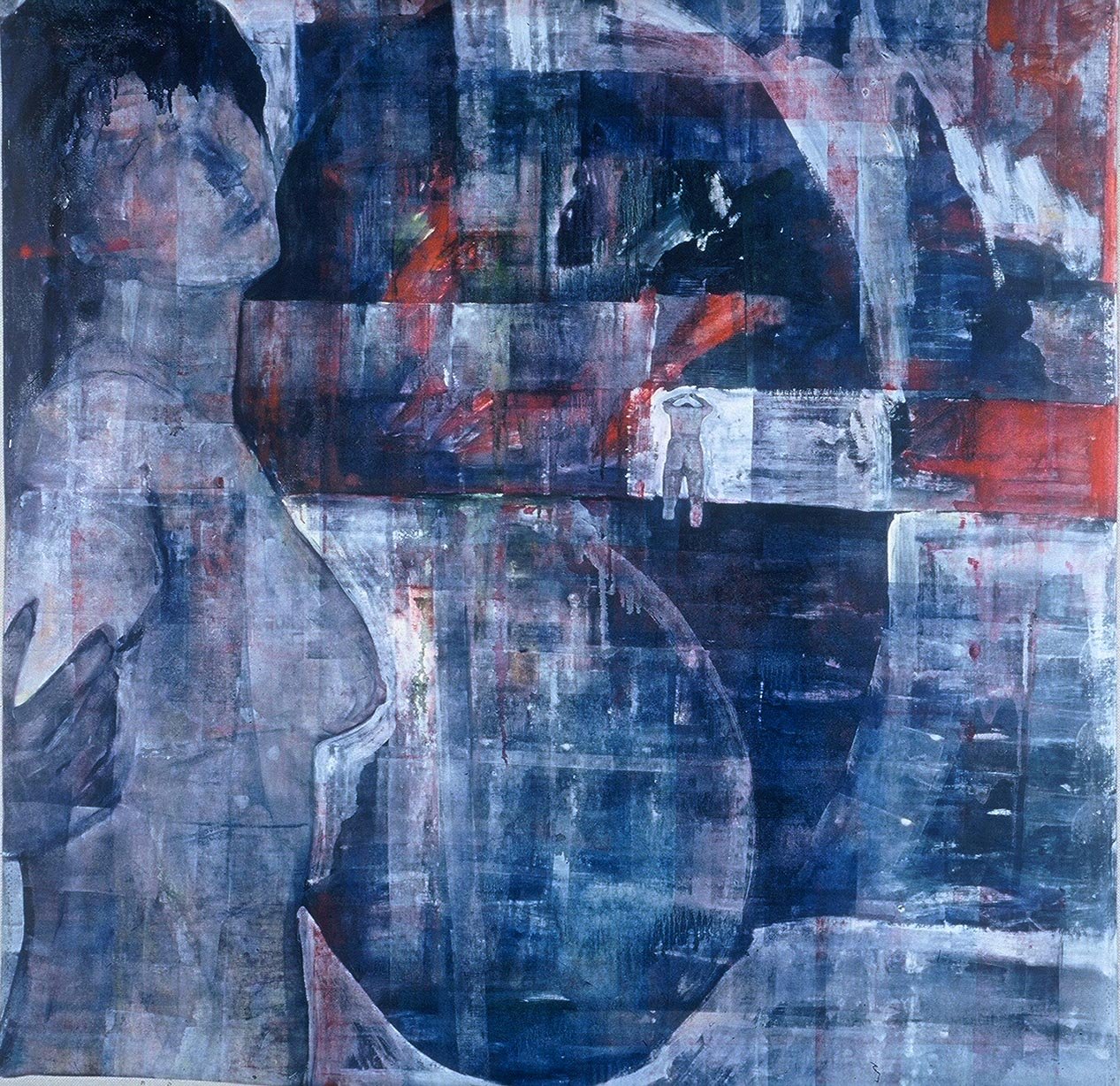
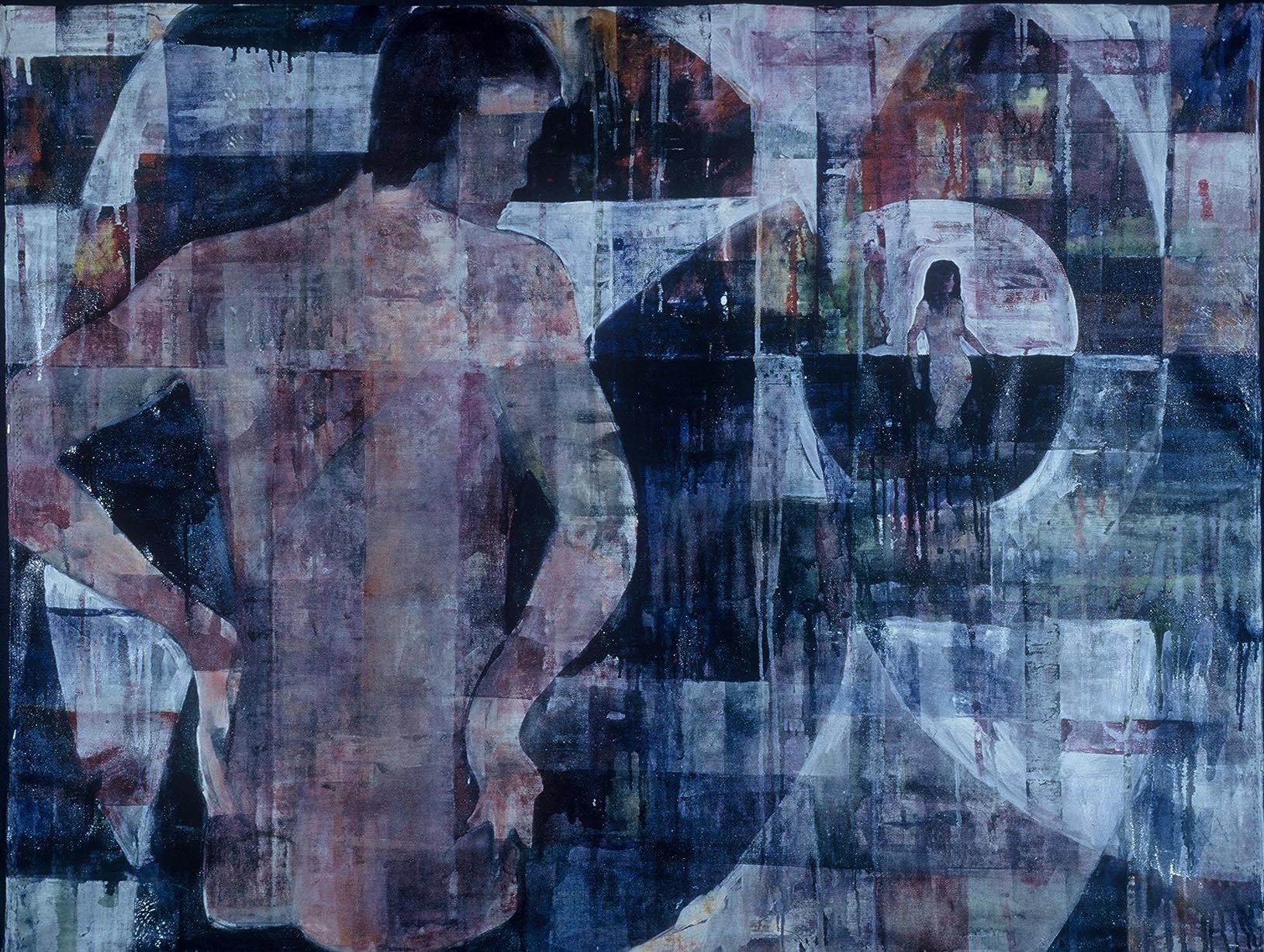
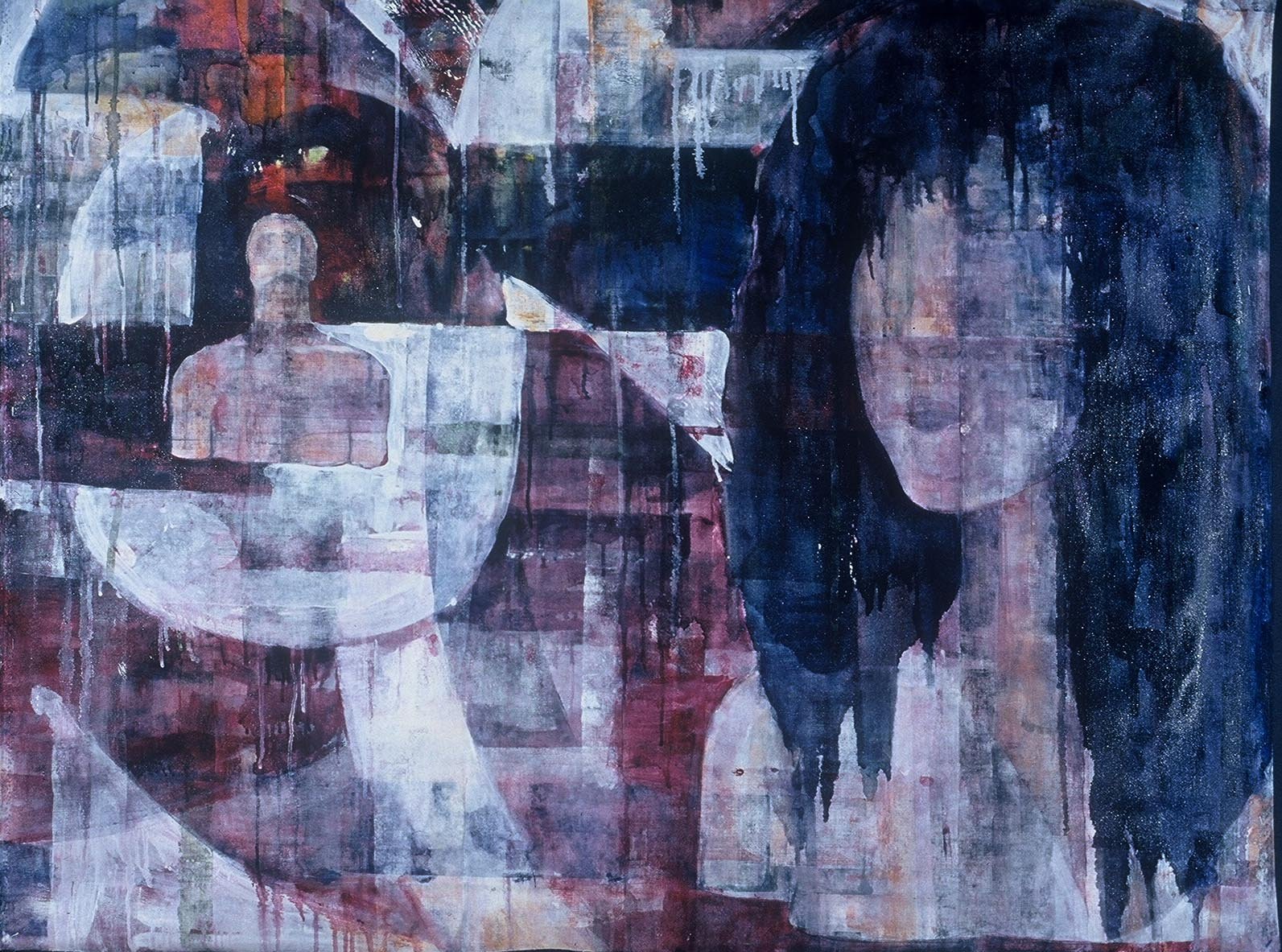
-
After all this time would you say this philosophy still informs your aesthetic sensibility?
Yes, probably more than anything else.
In the visual arts it manifests in the media I’ve explored, like monotyping—a place between painting and printmaking. Though I don’t have access to a press anymore, and I’m mostly focusing on figure painting, the techniques I used as a monotypist are still at play in my paintings, which consist of layering expressive textures of shape and color, usually very simple, nonlocal color, and then subtracting paint with rags. I’ve been told my work has a Modernist feel, and that makes sense, given my interest in not only the poetic but also artistic innovations of that time, namely Fauvism and Expressionism—cusp movements that sought to break with traditional representation in favor of bringing more attention to the act of painting and the medium’s expressive potential.
I’ve never verbalized it until now, but even the fact that I can’t seem to pull away from representing the nude is another kind of bardo fascination. The studio figure is a rather in-between creature, especially nude, and is fraught with a controversial subject/object history. Because they exist in a kind of mythic, aesthetic, erotic limbo, nude figures don’t seem to belong anywhere. This captivates me. There are all kinds of vulnerabilities and creativities, psychospiritual and geosexual political possibilities in not fully belonging somewhere or to someone. In the act of painting, I experience these figures as abstractions of such possibilities, abstractions of myself, even. There’s a breakdown in the subject/object dichotomy. It’s a very visceral experience.
That sounded very ivory tower and mystical all at once. Well done. What about poetry?
I would say most of my work falls in between free verse and form, which might mean that from either of those perspectives, I won’t make anyone completely happy. I like the freedom of not being married to meter and rhyme, but I flirt with both by employing tons of assonance and loose patterns of rhythm and line length. Some visual form, melody of sound and rhythm usually emerge, but never fully gel. And then there is the matter of content. Most of my work circles some hesitant nuptial between polarities: sacred and profane, self and other, male and female, gay and straight, infidelity and loyalty, natural and artificial, science and mysticism, presence and absence, independence and dependence, freedom and confinement. The list could go on.
Do you ever combine your poetry with your visual art?
Not often. Many years ago I wallpapered a gallery with collected and original writings. That pissed off a couple of my art professors. I’ve also done an oil self-portrait with shreds of my poetry collaged into it. And last year I gave a reading with two large abstract paintings as backdrops, but other than that, I haven’t explored it as much as I’d like to. Perhaps the marriage comes in bringing a visual sensibility to poetry, and a poetic sensibility to painting.
You’ve used a marriage metaphor three times now. What’s going on?
Hmm. I’m intrigued by figurative marriage—perhaps the ultimate metaphor for the natural state of things. I can see why people are so drawn to literal marriage, the urge to enact that state in a very concrete way. I admire people who do it well and feel compassion for those who struggle with it. I suppose the bardo principle also rules my relationships, my attractions to other human beings. I’m not sure how I feel about this, or if this is at all a good thing.
Why cultivate it then?
I’m more at ease in the between, and when I think I could settle in one place for long, I tend to slide out, or to at least want to very badly. Actually, I’m not so sure I am at ease being this way. Enlivened is perhaps the better word. Bardo places can be very uncomfortable in a world where staying put helps the gears turn more easily, but there is an irresistible power there. A creative power. I think the truth is we are all in between something or other. How aware we are of the fact, or how much we fight or embrace our tendencies toward extremes of solidity might be directly related to how much we suffer.
Don’t take this personally, but does TNB really understand what they are getting into by asking a Buddhist to interview herself?
Who is asking me this question?
Who is answering it?
Ah….hm.
Sneaky segue. And a little corny, I might add.
Oh! That was a spontaneous “ah,” I swear. But it just so happens that ah is the title of my first book, and you might want to ask me about it. Besides, Rosemerry suggested you ask what I am most afraid of when I think of people reading this interview, so we might as well get that out of the way while I’m shamelessly self-promoting my book: fear of being perceived as corny.
Hey, I’m supposed to ask the questions, not Rosemerry.
What’s the difference? We love her. She also suggested you ask me what I wish we would not talk about.
You are being controlling.
I’m just offering suggestions. So, do you want me to answer that one?
No.
Ok.
Can we start over here?
Always.
So, what do people need to know about ah?
Its genesis is largely described in the opening notes to the book, but I’m happy to explain a bit here. In 2010 I had begun studying a collection of poetic meditation instructions written by ancient Dzogchen masters of the Bön Buddhist tradition. By the summer of 2011, it occurred to me it would be interesting to attempt to write my own poetic reflections on this practice. So, basically, the poems that became ah were simply a prolonged exercise in using one mindfulness practice, poetry, to clarify another, Dzogchen. Or maybe it is the other way around.
I didn’t plan on arranging the poems into a book until Markiah Friedman of Liquid Light Press invited me to send him a manuscript after seeing me perform a couple of them on his Poet’s Co-op TV show. I live in a very conservative part of Colorado and hadn’t read them to anyone there yet. Reading the poems for Markiah and three cameras not far from Buddhist-friendly Boulder made me, um, bolder. I’m glad I took the risk. It turns out Liquid Light Press is dedicated to publishing poetry that explores realms of spiritual experience with an attention to craft. It’s a great venue for poetry that usually doesn’t have a place in more academically focused publications. Liquid Light Press is one of those in-between places I love.
Can you say something about Dzogchen?
Sure. The word itself means great perfection and is so simple, experiential and nonconceptual, it’s a little hard to explain. Practically speaking, it’s a kind of meditation practice whose purpose is to help us rest in what is called our natural mind. It is said our minds are naturally spacious and clear. But it’s hard to relax into this state without a little help. Hence the instructions. Hence the practice. It’s not about getting rid of thoughts, though. That’s impossible. It’s more about changing our relationship with the thoughts, emotions, words and images that run around in us. In practice, they might still gallop about at first, but we don’t ride off on them. Eventually they nestle down for a nap. When they stir, we gently notice. Without any effort on our part, the animals come and go, arise and dissolve, of their own accord, and we learn to rest in this subtle movement without judgment or nihilism. I’ve used a metaphor here, but promise me you’ll forget it. There’s room for everything in this place. I like to go there. I think most people might like to, regardless of their personal belief system or lack thereof.
Watch yourself, Sister Kellum.
That’s funny. I know with our Mormon upbringing you worry about people thinking you are trying to convert them or something, but you and I both know this isn’t about religion but sanity. Most of us are pretty busy-headed. Who doesn’t want a break from that? Everybody deserves some respite from, some perspective on, the entertaining tango of their own horseshit and glory no matter how they come by it. I’ve found that when I come back to the mundane world after a successful practice, creativity comes more spontaneously. Words flow. Crafting and revising is a joy. Though these aren’t the reasons I practice, I love these perks, and that’s how most of the ah poems were born. Not all of them are about being open and spacious (which is what ah, or the Tibetan letter a, means, by the way). Many of these poems are actually just my mind rustling words instead of resting in space.
Isn’t writing conceptually about something that is meant to be a nonconceptual experience kind of counterproductive?
Probably. The great irony of writing this book and then memorizing many of the poems for performance is that they have become obstacles to my meditation practice. Shortly after a performance, when I’m on the cushion, a few of the clearer poems prance around, proudly pontificating about my natural state, and then I miss out on the experience completely. The ego is so tricky. So, not taking these poems too seriously has become another layer of my practice. I’ve had to let them go, or stop riding off into the sunset on them, at least.
I thought you said you left behind organized religion. You sound pretty seriously involved with this Bön stuff.
I know. I don’t want to talk about that too much. Discussing my dedication to the Bön tradition always makes me a little nervous. And to be honest, having my book out there only compounds that feeling because I don’t want pegged as someone setting herself up as some kind of guru, on one hand, or as only a Bön poet, on the other. It’s a bardo book for me—not fully at home in the world of Buddhists or poets; though, it was a fine moment to share a few of these poems with my teacher and sangha at the end of September this year.
I should say here that most of my poems, outside of ah, are not about meditation practice at all, though it is true my poetry is driven by the undeniable need to bring awareness to my living. I’m not sure why I suddenly feel this urge to defend myself. I’m a word-addicted person who needs serious help with this fact. My head rarely shuts up. That’s a good reason to practice. Can we talk about something else now?
Sure. What?
I want to say that yesterday I raked leaves with my three big kids, ages 10, 13 and 18—two of them are my size now—and I was grumpy almost the whole time. We have two dogs, and doing poop patrol in the midst of brown leaves is the worst kind of Where’s Waldo. Sam, the youngest, helped me with this awful task without complaining. We wore plastic grocery sacks on our hands. My two oldest kids, without my guidance, figured out the coolest way to bag leaves quickly. Grey held two rakes parallel to his arms and scooped up leaves like the most efficient Edward Scissorhandsian boymachine (Sam asked, “Isn’t that a scary movie?” and Grey said, “No, I think you are confusing horror with horrible.”), while Sage used a five gallon bucket to repeatedly compress leaves in the garbage can. I took over when Sage had to leave for work. All told, there were 24 bags, and we finished in just a couple hours. I’m sore. I’m psyched my kids are so smart and helpful when they aren’t texting or Facebooking and playing Minecraft. I can’t believe these huge beings came out of me, talk to me, critique films, and help rake leaves. I admire their ability to inhabit both digital and analog worlds quite joyfully. They had me laughing by the end of the chore.
Do you write about them much?
Sometimes. I’ve always loved how Robert Hass writes about his kids. One poem in Human Wishes, the first book of his I ever owned, reveals a moment when his son, Leif, tells him, “Dad,[…] I’m not taking any more/ of this tyrannical bullshit.” And when Hass responds by reading a line from Chia Ya, the boy adds, “And another thing, don’t lay/ your Buddhist trips on me.” I hope my work is as honest as that. I have collected almost everything he’s written. Our styles are quite different, but I adore Hass, his catalogues of observation. He isn’t corny at all. His long lines have carried on a low conversation with what is hardest in me for many years. There is a natural, honest rhythm in them that I’m always aiming for. In his essay, “Rhythm and Making,” he tells us, “Because rhythm has direct access to the unconscious, because it can hypnotize us, enter our bodies and make us move, it is a power. And power is always political. That is why rhythm is always revolutionary ground.” Mmm. Such words inspire gratitude for all the poets and song writers whose rhythms have revolved and evolved me over the years: Hass, of course, and Eliot, Roethke, Stevens, Whitman, Ginsberg, Chris Whitley, Ani Difranco, Greg Brown, and a generous and gifted family of Colorado poets who play at words with me.
One more thing about Hass. In the mid-90s, a guy in a local Fort Collins bookstore helped me locate him on the shelf. He informed me he didn’t like Hass’s work; it was too privileged, not political enough. As a graduate student at the time, I thought there must be something to what he said.
I bought Human Wishes anyway.
The night before I turned 51
I dreamed my father next to me
holding my hand through a parking lot,
his full cheeked smile held inside
those radiating parentheses reaching
out like endless arms from his eyes—
like mine in the brightest sunlight,
caught laughing in a rearview mirror.
(I learned to love my smile by loving his.)
We walked like this toward some store
I wanted to avoid, so he wouldn’t feel
he had to buy me something, the coat
I wanted, or some other ephemeral
thready thing to make up for a lifetime
of missing him, missing him, missing him.
I rehearsed in my mind what I wanted
him to know: I forgive you every day.
I woke before I said it, distracted by
a gallery of Japanese woodcut prints,
one of them a curious face watching us
pass as I noticed us drift across glass.
Building
A couple walks
into a house and knows
it is the one.
For years they
will bend it
and each other
toward
the life they want.
Around beds
of irises and echinacea
her gully rocks doze.
His callouses raise
walls for chickens,
basil, arugula,
pour a foundation,
puzzle together a dome.
Her toddler task:
hand up
triangular panes
of glass one by one
and wait
until he is done
with other
buildings paying
bills, feeding children.
Their silent fights
could fell a pine,
peel a porch,
invent new words.
Their tenderness
could birth a
sutra, decades,
this church.
New Pecking Order
It is hard to abide
the cruelty of chickens
raised from chicks.
You give the Easter Eggers
names that curse them,
like Curious Georgia, the gentle
smart, blond one who always
looked up from the litter,
eyeing you like a giant god
whose hand giveth,
or let a little girl name one
something edible like Brownie,
or your ironic teenage son
dub the tan one Sweet and Sour.
Worst of all, you yourself
name three Plymouth Barred Rocks
you can’t tell apart The Morrigan,
after the Irish triple goddess of war.
You even learn and then forget
how to pronounce their Gaelic names:
Macha, Nemain, Badb.
All but one of six are tattered now,
more or less plucked.
Curious Georgia? back bald
and bloody rumped!
The fully feathered one,
maybe Macha, you snatch and lock
in chicken jail just inside the run,
watch Curious Georgia’s
tail feathers re-grow as she struts
and shits across the chicken wire
roof of her tormentor who paces
frantically below, looking up.
KCRT Radio Interview
Enjoy this radio interview with Eli Debono of KCRT 99.3, based in Trinidad, Colorado, a few days before my reading for Corazon de Trinidad, hosted by the wonderful Hilary Depolo.
Gallery of an Old Woman
This is me at fifty, prying open
my chest with both hands,
mandorla doorway to a cavern
of crumbled yellow Legos.
Watch them fall out. My children
step on them in the dark.
I’m not quite beautiful.
Motherly mustache, single
whisker, necklace of thorns,
I wear my grandmother’s
long dead hummingbirds
like forgotten songs.
On the shelf is a spiral
shell, one my daughter
brought back from Spain.
When I miss her, I hold it
in my palm. Where does
the inside of the spiral end?
Is it one-eyed, eyeless,
this love for my children,
now grown? Where do I look
or swim, my wings,
my webbed feet, full
of hollow bones?
Two monkeys chained
to the window sill of my eyes
ignore the boats. Instead,
I’m lost in clouds—
floating white blood cells
saving me by fading.
with thanks to the following works of art:
Two Monkeys, 1562, by Pieter Brueghel the Elder
Yellow, 2007, by Nathan Sawaya
Self-Portrait with Thorn Necklace and Hummingbird, 1940, by Frida Kahlo
Decoy Study (Duck), 2014, by Maskull Lasserre
Sky Above Clouds III, 1963, by Georgia O’Keeffe
White Shell with Red, 1938, by Georgia O’Keeffe
The Scream

Time's receding bridge
brought us here,
alive, from the bellies
of our dead.
Wide eyed, mouth
open, bald,
you hold your head
like a burnt out bulb.
Give me your hands.
Let’s trade faces,
cradle one another’s chin
while sky screams red.
Blue water below
whispers flow.
We jump in,
swim for distant boats
whose purpose
is unknown.
If You Were Here We'd Have to Cook
a prose poem for my Crestone Poetry Festival beloveds
If you were here we’d have to cook. Bob’s Diner, Crestone's only greasy spoon, is gone for good. Tshering and Ling sold The Desert Sage, now in the throes of a facelift, and it’s been said their famous burger is on retreat somewhere trying to be chocolate. Scott and Ava’s Bliss Cafe aka the Crestone Brewery, home of the prickly pear marg with a shot of local piñon hydrosol, and Mandala Pizza, maker of the Close Encounter Calzone, are both closed, and the Silver Lotus, that new little food truck with tasty San Luis Valley-style Asian fusion, isn’t open in the cold. And Buck’s Wood-fired Pizza, also an outdoor affair, keeps the strangest days and random hours when brother Seth’s not hunting or hugging his kid. Hungry? too tired to cook? Check the hours on Facebook. You likely won’t get lucky, unless you like the folky Mystic Rose next door. What’s that? It’s closed? Hm. And Cloud Station (this omnivore recommends the paleo bowl and GF carrot cake) closes at 1 or 2, so around 4, I’d introduce you to Diana at the Merc, our little grocery store.
If you were here we’d have to cook.
In the A.M. I’d whisk a lumpless matcha with maple syrup and a splash of 2%. I promise not to scorch the leaves. Or stovetop a Bialetti pot of single shot of espresso if you prefer, and fry a green egg from our feathered girls (please don’t tell the POA about our secret flock), toast a slice of Everett and Anoushka’s homemade Mountain Mama Complet or Integral, pile it open-faced with arugula of unknown origin, a dash of salt. Peel a tangerine from some Florida orchard (try not to think too hard about that state).
For lunch we could stack a sandwich on the same bread (or gluten free in the freezer, Laurie)—maybe with some Scanga sliced chicken and cheddar from Salida (sadly, not Saleeda), nestled under some Elephant Cloud organic mixed greens that drove in on a truck in bulk this morning. Toss in some baby carrots and a handful of cheap Voodoo chips, our guilty pleasure, on the side. Or forget the bread—this could be a salad instead. I’d whip up some ginger dressing with the old Crestone Brewery recipe a cook slipped me pre-Covid.
If you were here, we’d have to cook.
Come dark, if Dorell had time to marinate the ribs, he’d fire up the Traeger, blow your mind with his famous barbecue. And the next night, he’d panko and air fry some chunked avocados and catfish fillets, stir up his chili lime sour cream, shred more cheddar and fresh cilantro. I’d oil up the cast iron and warm the tortillas. Best fish tacos in town. For dessert, we’d blue torch the creme brûlée I baked earlier in the day, wasting the whites of all those eggs.
If we’re lucky, Julie will have brought more of what’s left of the liquor from Ziggies, oldest blues bar in Denver (man, I miss it), and you can even sit on two old Ziggies bar stools in my kitchen, reminisce those bluesy poem fests. We’d shoot some tequila, laugh too loud, peel a Peruvian mango (no stringy Mexicano), available here only in Febrero, so smooth, muscular, juicy, and watch those poets from Albuquerque feed each other slice by slice on the tongue, communion minus the body of Christ.
If you’re too drunk to walk or find your way through our Baca Grande maze to your air-bnb bed, don’t worry, one of us will drive you. Don’t forget to look up as you stumble out into the valley night, up the steps. More stars than you have ever seen will suck off your face, swallow you whole, spit out the stone of your dark soul, and you will want to write about it before you lay your head on the pillow.
Crestone Poetry Festival
A free virtual Poemfest!
From the Sangre de Cristo mountains and beyond, the fifth annual Poemfest will be a virtual revival that celebrates poetry and friendship in Colorado and New Mexico.
With readings and open mics, you'll have an opportunity to inspire and be inspired. And explore the website for the rest of the fest: do some shopping at the bookstore, and be a part of the Ekphrastic experience with local Crestone Artists.
While we are looking forward to the return of the in-person fest, we learned in 2021 that the poets can still party online!

